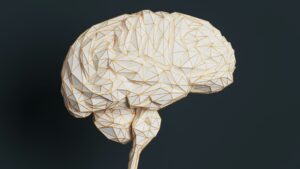We live in the time of doom scrolling, compulsive consumption, and spiritual restlessness. To understand such behaviour, we need to learn about dopamine—the brain’s “reward” chemical. God created us with the capacity to desire, anticipate joy, and pursue purpose. But when that capacity is hijacked by unhealthy attachments, we turn to everything but the one who can gratify our strongest desires.
Understanding dopamine and neuroscience through the lens of the Christian faith helps us reclaim our hearts, understand our brains, embrace new practices, and find real purpose.
Dopamine and the Longing for God
Dopamine fuels motivation and longing. Every time we anticipate a reward, it spikes. God designed the brain, not for survival alone, but for worship. As Augustine said, “You have made us for Yourself, O Lord, and our hearts are restless until they find their rest in you.”
The problem is not our desire. It is misdirected desire.
In his book The Power of Habit, Charles Duhigg notes that dopamine is not just released when a reward is received, but when it is anticipated. This anticipation builds craving, which drives habits. This craving, neurologically encoded through dopamine, reveals our deep longing for satisfaction and joy.
In a fallen world, dopamine often leads us to chase counterfeit joys—wealth, entertainment, food, pornography, social media, even religious performance. These things stimulate the dopamine cycle but leave us feeling empty.
The problem is not our desire, it is misdirected desire. God made our hearts to seek after him. The invitation of the gospel is not to suppress our desire but to redirect it toward the one who can truly satisfy it.
Christian Practices that Reshape the Brain and Heart
In Romans 12:2, God calls us to be “transformed by the renewing of our minds.” Neuroscientists confirm that habits rewire the brain. They call it neuroplasticity. Christian spiritual disciplines serve this purpose of reshaping our minds and renovating our desires.
Our spiritual practices have real neurological impact and produce fruitful spiritual outcomes.
Charles Duhigg outlines how habits work through a cue–routine–reward loop. As this loop is repeated, habits become automatic. Spiritually, we can use this same framework to cultivate holy habits.
In his book Habits of Grace, David Mathis says, “The means of grace are not about earning God’s favour, but about positioning ourselves to experience his transforming love.”
He highlights three core practices: hearing God’s voice (Word), having his ear (prayer), and belonging to his body (fellowship). These “habits of grace” not only form our souls but shape our desires and affections.
In Acting the Miracle, John Piper and David Mathis argue that sanctification is a cooperative act. God works in us, and we act by faith. It runs parallel with the way spiritual habits change neural pathways—not by passive belief, but repeated action driven by grace. Piper writes, “God is the decisive worker in our sanctification, but we are not passive.”
Our spiritual practices have a real neurological impact and produce fruitful spiritual outcomes.
|
Practice |
Neurological Impact |
Spiritual Outcome |
|
Contemplative Prayer |
Calms the amygdala, enhances focus |
Builds trust and intimacy with God (John 15:4) |
|
Scripture Meditation |
Strengthens executive function |
Renews the mind (Romans 12:2) |
|
Confession & Community |
Lowers cortisol, increases oxytocin |
Reduces shame, promotes healing (James 5:16) |
|
Service & Altruism |
Boosts dopamine and serotonin |
Imitates Christ’s love and humility (Phil. 2:5) |
|
Sabbath & Rest |
Resets dopamine baseline |
Restores dependence on God’s provision (Ps. 23:1) |
Freedom Through Grace
Sinful habits are not simply bad behaviour. It is bondage of the will. Whether its doom scrolling, impulse buying, workaholism, substance abuse, screen-addiction, or approval-seeking, our dopamine system can entrap us. As Duhigg notes, repeated cravings shape habits that feel impossible to break. Without intervention, we stay stuck in loops.
Jesus does not crush desire. He redeems it.
But the gospel provides grace over guilt, community over isolation, new identity over shame, and the power of the Holy Spirit over self-effort.
Grace does not simply pardon our sins. It gives us the power to break out of them. Testifying to Christ is not simply behaviour modification; it is holding out true freedom in Christ.
“If the Son sets you free, you will be free indeed” (John 8:36).
Ambassadors of Christ in a Dopamine-Driven Culture
Modern culture thrives on quick hits and short attention spans. Our testimony of Christ must speak to the imagination and desire, not only to the mind.
In his book Evangelism in a Skeptical World, Sam Chan says effective witness in contemporary culture must connect emotionally and relationally before it connects cognitively. He encourages contextualised storytelling and hospitality—means that not only convey information but also stirs longing and joy. This directly engages the dopamine-based craving for belonging, meaning, and beauty.
Here are some simple ways to extend the grace of God to those we love.
- Tell stories of transformation that show what new life looks like.
- Model joy and rest, not stress and striving.
- Create space for stillness and awe in worship gatherings.
- Invite people to practices, not just beliefs (prayer, silence, simplicity).
- Build a community where love and healing are tangible.
The gospel invites people into a new reward system—a new pattern of delight grounded in God’s presence and his people. The church becomes a laboratory of joy and freedom, not a place of rote instruction. It becomes a rehabilitation centre for heart-idolatry, a training ground for holy habits, and a fellowship of joy that flows from worship, not sensation fuelled by entertainment.
Redeeming Desire
Discipleship is about retraining desire. We teach people to seek Jesus not because they should, but because he is better than life (Ps. 63:3). It is the grace of God that teaches us to say no to ungodliness (Titus 2:11-12).
The world may use dopamine to distract and enslave. But in God’s hands, even this molecule becomes a servant of true delight. Jesus does not crush desire. He redeems it.
Let us practice a faith that forms our minds, heals our cravings, and testifies to a better joy. And may our witness awaken in others the hunger they were made to feel—for Christ, our true and complete reward.
“Taste and see that the Lord is good” (Ps. 34:8).







